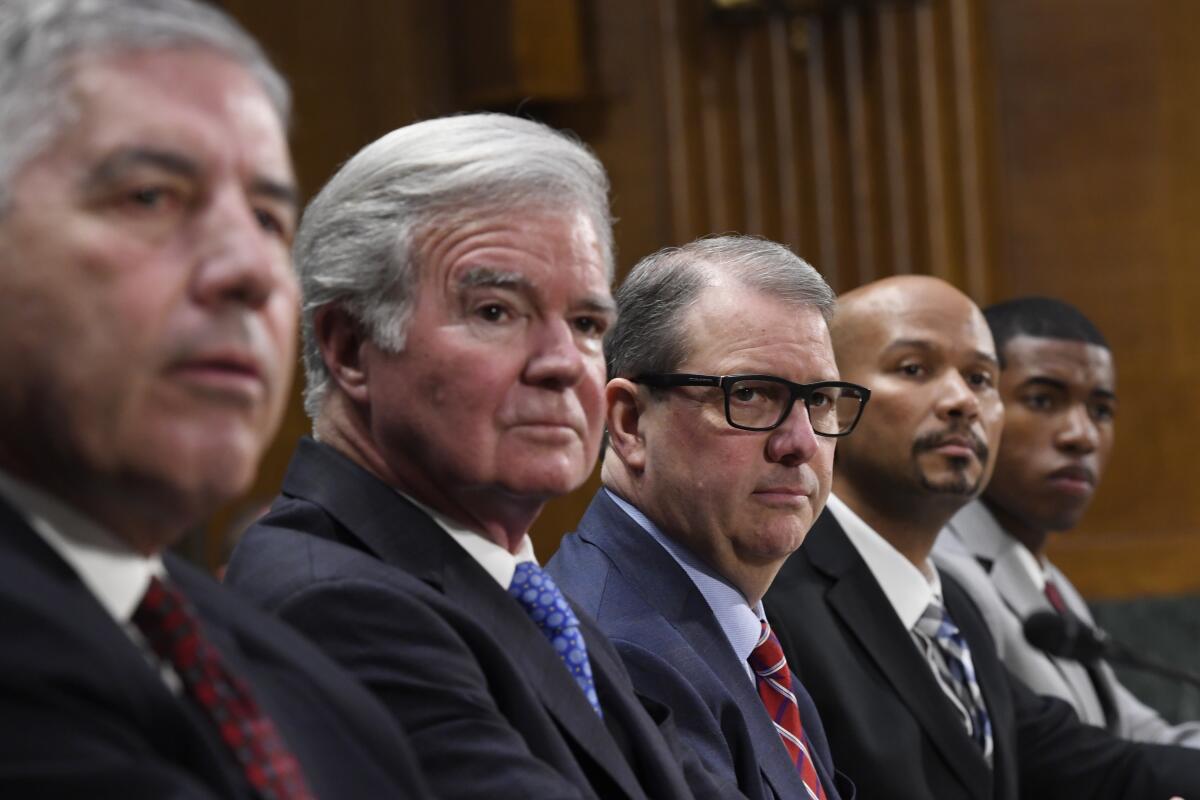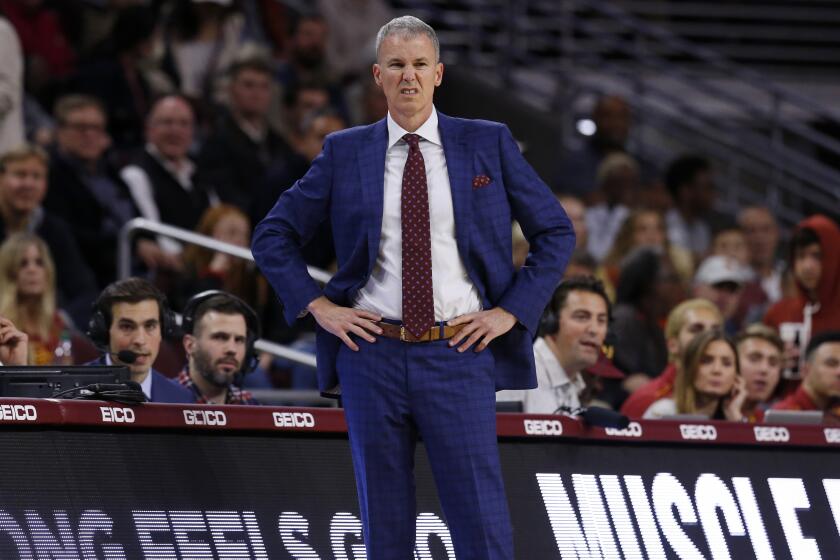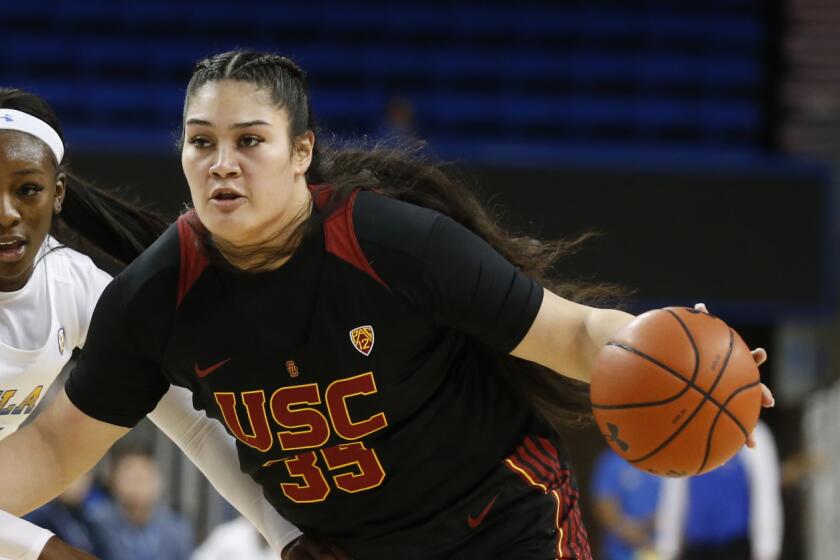‘Outdated,’ ‘antiquated,’ ‘fantasy’: NCAA takes hit from Senate on name, image and likeness

- Share via
Mark Emmert has been feeling the pressure. That, of course, is part of why the NCAA president sat among a panel of witnesses Tuesday morning on Capitol Hill, opening himself up to questions from the U.S. Senate Committee on Commerce, Science and Transportation on the issue of name, image and likeness (NIL).
Watching as more than half the states in the union work to create legislation to allow college athletes to profit from endorsement deals, led by the signing of California Senate Bill 206 into law last fall, was one thing. But, until Sen. Richard Blumenthal (D-Conn.) took the microphone as the ranking member of the subcommittee, answers hadn’t been demanded of Emmert in a public forum with such urgency and flat-out vitriol.
Blumenthal accused college sports administrators of living in a “fantasy” from 50 years ago, calling the “rhetoric and images” used by them “antiquated as leather helmets.” He said that made him “angry.” He said the NCAA is “late to this game,” and told Emmert he’d better speed up.
Emmert had to know someone was going to get in their licks Tuesday. He had already stated that January 2021 was the present timeline for the approval of any proposals to change the NCAA bylaws, and, just as he was explaining to the senator that the schools are working “very hard to make sure they don’t create unintentional consequences,” Blumenthal cut him off, apologizing for his own time being limited.
“Would you agree that the present system of compensation is unfair and outdated?” Blumenthal said.
Marty Blazer, an informant in the federal investigation into college basketball corruption that ensnared USC, is assisting the NCAA in its probe.
“I certainly agree that the NIL model that’s in place needs to be modified,” Emmert said.
“Radically modified,” Blumenthal said.
“Correct,” Emmert said.
Blumenthal wasn’t done.
“Does everybody on the panel agree with that point? Please raise your hands if you agree,” Blumenthal said.
Big 12 Conference Commissioner Bob Bowlsby, Kansas Chancellor Douglas Girod, National College Players Assn. Executive Director Ramogi Huma and Kendall Spencer, chair of the NCAA’s Student-Athlete Advisory Committee, raised their hands.
USC forward Alissa Pili is used to competition, being the second of eight children. In her freshman season, she’s become the Trojans’ leading scorer and rebounder.
“The record should reflect that all of the witnesses today have agreed that radical modification is in order,” Blumenthal said.
Even Bowlsby, who spent most of the time he had the floor warning of the “dark shadow between ideas and reality” in regard to the implementation of NIL rights for athletes and the impact it would have, raised his hand.
Huma, the former UCLA football player who has become a leader in the college athlete rights movement, gave his approval of Blumenthal’s message with the most gusto.
Huma was the lone witness called to speak who was not espousing views in support of a slight modification of the status quo, and his attendance Tuesday felt crucial for an even-handed education of the assembled senators, the majority of whom appeared to be genuinely learning about the finer details of this issue.
Where Girod was claiming that NCAA sports as constructed are “the envy of the world,” Huma was reminding senators to consider the schools’ motivation for finally having this discussion.
“The states are just getting started, there’s 28 involved,” Huma said. “Our concern is there will be an overreach by the NCAA and they’ll turn it right back to what it is today. In reality, they never would have been at this table without the states pushing.
Rachel Garcia and Bubba Nickles, who helped UCLA win the national title in softball in 2019, are two of three college players to make Team USA’s roster for the Olympics.
“The [NCAA] Board of Governors, they don’t have to go through that route that takes a long time. California has a law. That’s a legal issue. They could wake up tomorrow and put uniform policies in place structured around what’s going on in the states.”
Emmert took Tuesday to lay out a vague groundwork for what the NCAA would want a federal solution to look like. Yes, he said, the athletes should receive more benefits for the use of their NIL. But “guardrails” would need to be in place to ensure that the recruiting environment for prep prospects is not unduly influenced by inflated booster payments disguised as third-party endorsement deals, and athletes should not be legally considered employees of the schools.
Emmert also expressed a fear that any changes to the NIL benefits allowed would result in the NCAA landing back in federal court facing fresh antitrust litigation.
Huma asserted that the NCAA, by soliciting help from Congress, will be hoping for an antitrust exemption that would allow it to set artificial caps on the amount players can earn under the new model. He warned of the NCAA using “guardrails as hammers.”
The senators on the subcommittee each had a short window for questioning during the hearing, which lasted more than two hours.
Thinking about the schools in their states and their passionate constituents, several wondered whether NIL rights would give an advantage to schools in states with big markets compared to schools in more rural states. Another asked whether it would lead to less competitive balance, the implication being that the schools with the most resources will be able to outbid schools with less resources.
Huma provided facts that aimed to show that was already the case, regardless of whether athletes receive compensation.
Sen. Jon Tester (D-Mont.) joined Blumenthal in pushing Emmert to get the NCAA moving faster.
“You don’t want us to solve this,” Tester said. “You want us to help you solve this. So the question is, where are we at in talks? … Do you have anything on paper right now?”
“We don’t, but we will by April,” Emmert said.
“Are you willing to share that with the folks that are at this table and with us?” Tester said.
“At that time, certainly,” Emmert said.
“And you’re willing to take input into how you can make it better?” Tester said.
“Absolutely,” Emmert said.
Sen. Jerry Moran (R-Kan.), the chairman of the subcommittee, finished the hearing with some thoughts.
“My personal view is, it lies with those of you at that table at the moment, not us,” Moran said. “But we stand able, we stand ready and willing, to be helpful.”
More to Read
Go beyond the scoreboard
Get the latest on L.A.'s teams in the daily Sports Report newsletter.
You may occasionally receive promotional content from the Los Angeles Times.













